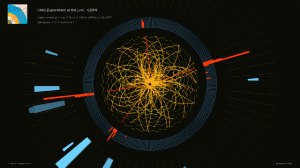ROE: Yes. Of course we still have a lot of work to do. And, we still expect to discover new surprises at the Large Hadron Collider.
STANDEN: Why has it been so hard to find the Higgs boson?
ROE: First of all, the Higgs boson, if it exists, is fairly heavy, much heavier than a proton. And it is hard to produce them. So, the way that we discover new particles at the Large Hadron Collider is we collide together beams of protons, and the quarks and gluons inside the protons collide with one another to produce new particles. And then the Higgs only lives for a tiny fraction of a second. It decays into other particles. Those particles in turn decay into yet more particles, and you need this huge detector that detects all the tracks.
STANDEN: The results of the experiment will be released in the middle of the night before July 4. Are you staying up?
ROE: It's extremely exciting. I mean, the discovery of the Higgs is something that we particle physicists have been awaiting for decades. I doubt if I'll stay up all night, but I'll probably wake up in the middle of the night and check my computer to see what the result is. It's likely that they will not have a definite discovery. The best we can probably hope for at this point is that the evidence that was very tantalizing back in December may get stronger.
STANDEN: So that’s why we’re here right now, CERN has gotten stronger, right? And it’s able to collide these photons with greater energy, and that’s what gives us more data to work with?
ROE: Yes. CERN now has the highest energy collider in the world. It would have been the Super Conducting Super Collider down in Texas, but that project was cancelled by Congress in 1993.
STANDEN: It sounds like there are still feelings in these United States that we let Europe take over this field.
ROE: We did. There are a large number of American physicists working at the Large Hadron Collider, and I think all of them will be extremely happy if the Higgs is discovered, or if we see strong indications of it. But along with that happiness there always got be a bit wistfulness that this is a discovery that really could have been made in the United States by the Super Conducting Super Collider.
STANDEN: Because we have the brainpower to do it. I mean those are our scientists, a number of them.
ROE: Oh absolutely. We were well on our way to building an even higher energy machine. If this is the Higgs we’re about to discover, it would have been discovered by the Super Conducting Super Collider years ago. The Large Hadron Collider only got going after the Super Conducting Super Collider was cancelled. They would have come here to collaborate with us.
STANDEN: Why should this have been an area in which we invested millions of dollars to be number one in? Does it cure cancer?
ROE: No, it certainly doesn’t cure cancer, but I think the US has always been a leader in science and technology. And when we have world-leading projects that inspire young people to go into those fields, and we know that eventually there is a big payoff to society and to the economy, when we have a strong base of science and technology. It’s a shame for that to leave the US and instead happen in Europe.
